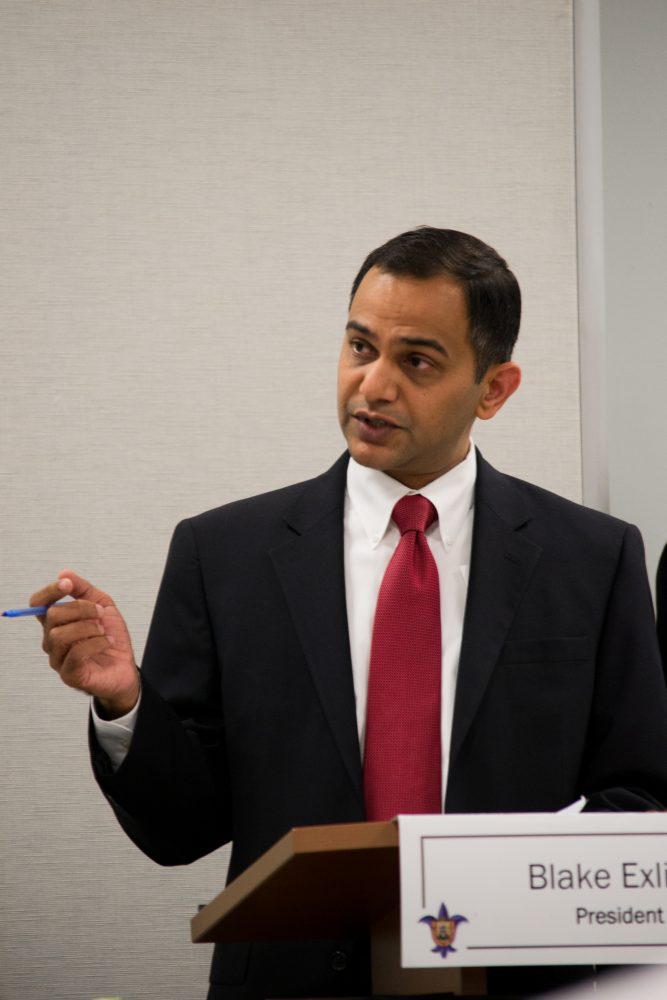Both administrators and faculty members at Saint Louis University have noted communication difficulties concerning proposed faculty evaluation systems throughout the 2012-2013 academic year.
Despite agreement on the desire to improve SLU as a whole, faculty and administrators cannot seem to agree on the best process to obtain their goals.
The communication issues regarding faculty evaluation began in the fall of 2011. Multiple committees were formed to address a problem with the method of faculty evaluation at SLU— a problem recognized mutually by the faculty and administrators.
Following the reports presented by each committee, the Faculty Senate tapped Terry Tomazic, professor of Sociology and Criminal Justice, to lead a new committee in drafting a proposal for an annual faculty evaluation process to present to Vice-president of Acadmeic Affairs Manoj Patankar. The proposal was presented to Patankar on June 5, 2012.
The faculty proposal placed a high value on transparency in the methods of evaluation and rewarding high-performing faculty. It was also evident that the faculty thought faculty evaluation had to maintain a certain qualitative nature, not settling on a strict points system. Instead, the proposal made an attempt to use a points system that allowed for the best judgment of chairs and deans in each assessment to override a need for adherence to very strict metrics.
Of particular importance in the proposal was revision of the merit pay system currently in place at SLU. The proposal describes the current system as a “zero-sum process” and states that there is not enough demonstrated recognition of excellence.
According to Dr. Mark Knuepfer, head of faculty senate, the faculty did not recognize any of their recommendations in the evaluation process proposed by Patankar.
The draft proposal set forth by Patankar in August was demonstrably different from that developed by Tomazic’s committee. According to Patankar his draft was based on all of the feedback he had received from the different committee reports and data collected by his own team members over the last two years.
Patankar’s original draft made no mention of altering the merit pay system, which the committee cited as a major issue with the current method of annual assessment.
His proposal instead focused on a new and rigorous system for annual review.
Patankar placed emphasis on a universal system of grading professors’ performances.
The system was based on various metrics, and according to Knuepfer different facets of the grading system were weighted to be of more import than others.
The faculty summarily described Patankar’s proposal as “irremediably flawed.” The original draft was taken off the table.
As of October a new draft of the faculty evaluation policy was in discussion.
The new draft demonstrates an attempt to work more closely with the concerns and desires of faculty members.
The evaluation now has a “Comprehensive (Five-Year) Review,” and neither the loss of tenure status nor the termination of contract are possible outcomes of the review.
He also added the possibility of a “substantive merit increase,” which demonstrates more consistency with the evaluation policy proposed by Faculty Senate.
“I made it very much a developmental process and took out any aspects of punitive interpretation,” Patankar said.
He has met with SLU Medical School chairs and with Doisy College to discuss the new proposal. Both constituents said the new draft is an improvement.
Another area where communication has been an issue as of late is in the development of the University Strategic Plan.
The process for developing a strategic plan to improve all facets of SLU began in 2010.
A faculty “think tank” was put together to draft a framing document for the strategic plan that SLU administrators and educators hoped to develop and implement in the coming years to ensure the growth and improvement of the university.
Based on the current iteration of the University Strategic Plan there is a very strong focus on specific metrics. The evaluation of faculty effectiveness in the draft of the plan involves an Academic and Research Index, which has three sub-indices focused on academic performance, research and scholarship performance, and financial viability.
According to Patankar the work of the committees on teaching effectiveness, research and scholarly product, and service impact will have a demonstrable impact on the university-wide strategic plan, with their findings plugging in directly to various aspects of the plan. He stated that the strategic plan is not intended to be a blanket policy for the campus.
Instead he plans on many different plans being developed with similar goals in mind across the different units and schools comprising SLU.
However Eleonore Stump, professor of Philosophy and one of the members of the original think tank, said the development of the Strategic Plan is “seriously disheartening.”
“Its emphasis is on such things as ‘performance metrics’ to be used for ‘reward systems’ intended as incentives,” Stump said.
She finds the current plan to be a departure from the original intention to “highlight the University’s core commitments and values, which ought to govern its strategic planning.”
The framing document makes no mention of the metrics or indices in the current draft of the plan.
Instead the framing document numerated the mission and values distinct to SLU and listed ways in which the University might continue to demonstrate and develop its character.
While the faculty and the administration agree on the fact that SLU needs to make improvements, the lack of a shared methodology has been a major detriment to the development of a cohesive plan thus far.
As University President Lawrence Biondi, S.J. rejected Faculty Senate’s no confidence vote, Patankar and Faculty will be left to reconcile their differences or attempt to function as two different brains trying to control the same hand.






